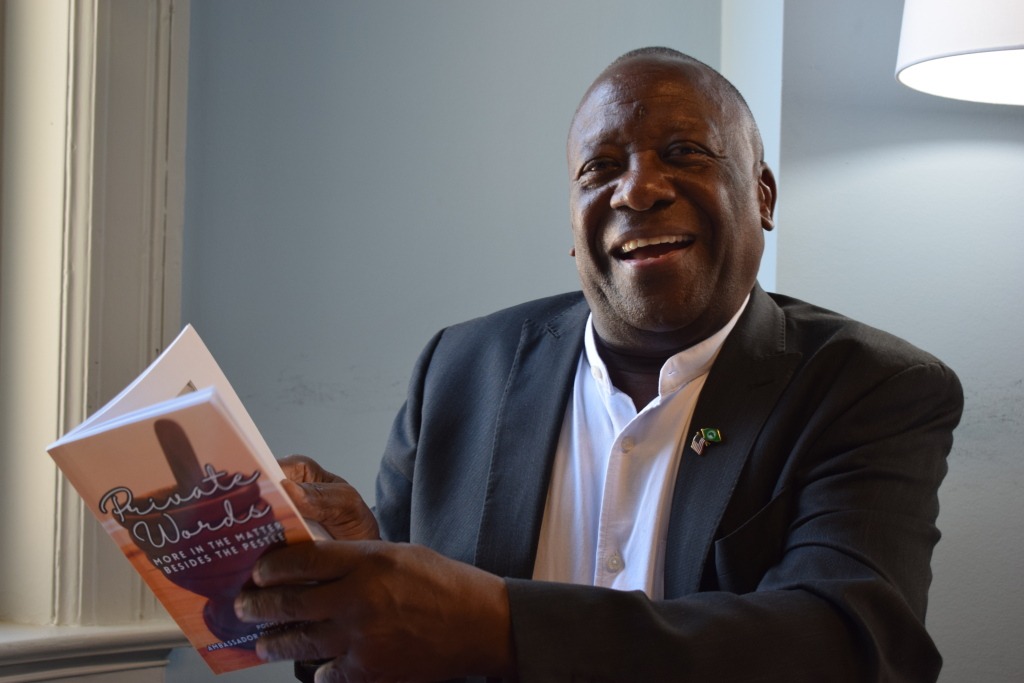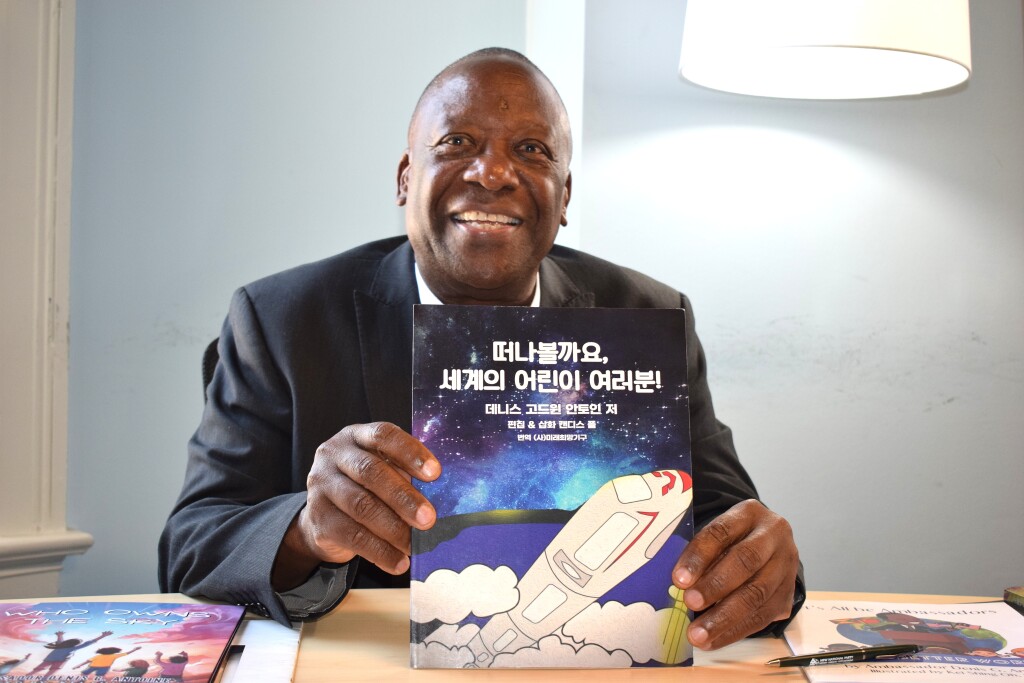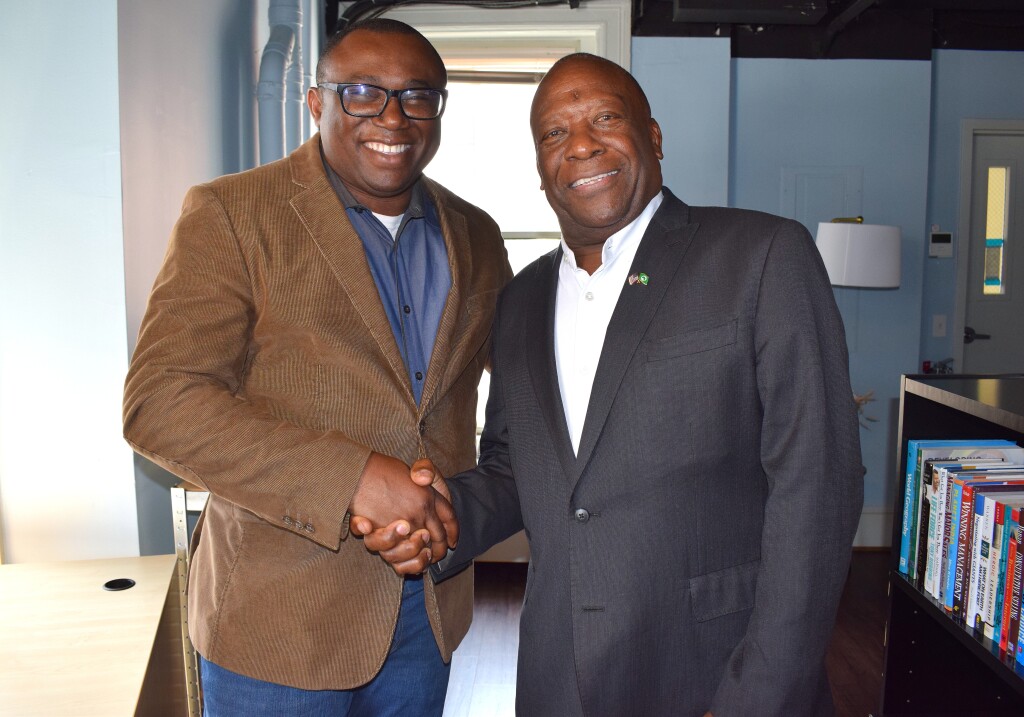Ambassador Denis Antoine has spent decades navigating the corridors of global diplomacy. In this conversation with Diplomatic Watch, he reflects on key chapters of his career—from helping shape the UN’s Sustainable Development Goals to serving as Vice President of the General Assembly. He recalls his time as Grenada’s Ambassador to the U.S., where he worked on education initiatives, post-disaster recovery, and grassroots diplomacy. He also talks about his books for young readers, the recognition he’s received, and why mentoring the next generation matters to him. It’s a candid look at how one diplomat from a small island nation made his mark on the world stage.You’ve had a remarkable journey in diplomacy. What first sparked your interest in representing Grenada abroad, and what kept you committed to that path over the years?
That is a big, strong question. Throughout my growing up, I participated in listening to my public officials who were in Parliament. On different occasions, I was listening. It excited me to hear my representative speak and to present themselves to the public. But then, I came to the University to study, and during my studies, I wrote articles to my country. I’d write about what my feelings were, what was going on at home. So, I was always interested in knowing how things were, and as it were, people were looking at what I was writing, and then they called and said, “Hey, we would like you to come and work with us at the embassy.” And that’s why I got involved. I stayed engaged in my country’s activities while studying abroad. And as a result of that, I got pulled into the process of representation. I first went in as an alternate representative, as a counselor. And it grew, and after a while, they said, “Hey, we want you to come back and be Ambassador.” That’s where it started, but I knew nothing about being an Ambassador. However, in the process of learning, I went back to school. You know what I did? I did a survey, a study on orientation training needs for diplomatic offices: how Ambassadors learn, how they should learn, what they should know. I did a survey on that by interviewing and interacting with all sitting Ambassadors and diplomats of the [Country/Organization Name – please fill in]. And as it were, I came out with a very interesting documentary which I called Effective Diplomacy: A Practitioner’s Guide. And I took off from there.

Looking back at your time as Grenada’s Permanent Representative to the UN, what moments stand out to you the most—whether for the challenges you faced or the breakthroughs you helped achieve?
There were so many experiences that one walks away being saturated. I worked for the United Nations to learn to help my country the best I could. And so, I had a lot of interactions with my colleagues, and it was so interesting that we were working then on the Sustainable Development Goals (SDGs). I got so involved in drafting and crafting, and meeting with all the different regional groups, and especially my group, my CARICOM Caribbean group. We really had an engagement that meant you had to be involved. That experience of working with the various member states to forge the SDGs is one of the strongest takeaways that I came out of the UN with. While at the UN, to my not-so-much surprise but to my satisfaction, I was elected by the member states as a Vice President for the 69th session of the General Assembly. So, I served as Vice President of the United Nations General Assembly. And you know, the experiences of representing the United Nations in the various places across the world. For example, they sent me to Moscow. I was sent to represent the Secretary-General of the United Nations, and you had to be prepared. The size of my country meant nothing; it is the contribution of my country that meant all. So, the experience of being an equal member, an equal partner among member states, was very challenging but a very enabling experience for my country, and I thought I did my best.
During your time as Ambassador to the United States, what kind of impact do you think your efforts had on strengthening ties between Grenada and the U.S.?
It was indeed a rewarding tour of duty for me because I became totally involved in public diplomacy, in people-to-people diplomacy. I became involved in sharing Grenada with American society and with American citizens. I traveled throughout the United States. I established and appointed Consul Generals. In addition to that, my going in and out of the State Department to represent my country’s interests was very, very important. And particularly, my work with the educational institutions, getting scholarships and enabling my people to come and study in the United States and become more able to help my country. These were among the very important aspects of my work. As an Ambassador for Grenada in the United States, I thought, “A small country, but we had a big mission.” And I embraced it, and I am pleased with the contribution I made. I served in challenging times, especially when Grenada was wiped out by Hurricane Ivan, and you had to rally the community of my people; my Grenadians in the Diaspora. I had to organize and rally, and work with them. And I want to always express my appreciation, my gratitude for them engaging in working for Grenada. Again, I enjoyed it immensely because it afforded me the opportunity to make a very, very meaningful contribution in many ways: in education, in investment, in people-to-people diplomacy, in tourism promotion, in talking about and selling Grenada. When I talk about selling, I mean giving, making you a Grenadian. And so, everyone I met, I feel when I left them, I became their Ambassador. I love that aspect of promoting my country.

Small countries often have to be strategic in global forums. What approaches worked well for Grenada in making its voice heard in multilateral spaces?
I believe as an Ambassador of a small country, particularly in the multilateral process, one must participate in consensus building, because your strength lies in how many like-minded colleagues are speaking the same language and are aspiring to achieve the same outcomes. So, it is very important that you have intercollegiate consultations, ensuring that you speak. It’s a lot of speaking, but it’s also a lot of reaching consensus. I think the biggest challenge we have in achieving many things is achieving consensus. So, in a multilateral setting, you have to know about strategic partnerships and enable your country’s voice to be heard through the groups that you participate with. Shared responsibility was one of the responsibilities of my regional group, such as CARICOM. We have to agree, and we should generally agree on foreign affairs issues, foreign policy issues. And so indeed, it was the closeness of engaging with your colleagues that enabled you to be most effective. And then, you have a voice not just to influence but to bring your point of view to enable the group to see things in a more collegiate way. So, it was indeed public diplomacy, and multilateral diplomacy required building group consensus.
Throughout your career, you’ve worked with a lot of young professionals. What values or advice do you try to pass along to those entering the world of diplomacy?
That’s an area I enjoy a lot because I believe in this concept of a relay: passing it on, sharing what you learned with those who are coming after you. It is almost like leaving a crumbs trail. I love poetry, and throughout growing up, I learned about footprints in the sand of time. When I came and was looking for what my colleagues did, I couldn’t find anything in documents saying how they experienced things, what they experienced. So, I set out to almost leave a crumbs trail to show how one can achieve a certain goal based on the size of a country, the environment you worked in, and how you achieved what you achieved. I do believe that working to share what you learned from others that was useful in achieving your goal is a useful way to pass it on. I love intergenerational engagement—to work with young people not so much to teach but to share what I have learned that may be useful to them in their learning process. Again, the term I use a lot is intergenerational engagement, because I sit with a young person who comes to have a discussion. You are an Ambassador today because you represent your family, your club, your group, your age mates. Remember this: what is an Ambassador? A representative. And if we recognize that each of us at any time are Ambassadors, we represent our families, our churches. That’s how I looked at it. So, I have always said, “Let’s all be Ambassadors for a better world.” And when I meet young people, today I even tried to write and say to them, “Let’s all be Ambassadors for a better world,” because here is what Ambassadors do. Ambassadors, of course, we love to make sure that we dress well because we represent our country, and we present ourselves in a manner, in a character that is exemplary. However, the most important aspect is representing the values, representing the issues that you are sent to address, and making them known and making them heard in appropriate ways.

Since you returned to your current role, what have been some of the key things you’ve been working on? What’s been keeping you busy lately?
It’s very interesting. I came out of my last posting, which was in the People’s Republic of China, and while there, I felt that I learned some things that should be shared. And so, I said, “Let me write: Get on Board, Dear Children of the World, “because my generation is handing off the baton. So, I want my generation to do something useful. And so, I ask young children to get on board. But what I was doing is referring them back to the 2030 agenda. They were young; they were going to be adults in 2030. So, we went on a journey to 2030 to see how it turned out because the SDGs were successful. We really give young people the opportunity to visualize, to exercise their imagination, and to realize how their contributions are critical now because this is the future we are in. We are in the future that we have created. And so, to talk about the future when we are in it, we have to be careful to recognize the role of children now and not when they grow up, because as they grow up, they make a contribution. So, that is the kind of insightful engagement I want to have with young people. Because when does a child begin to make a contribution to this world? Therefore, I speak a lot about how you are in the future now, so be all that you can be, be the best that you can be, because what you are now is what you are taking to tomorrow. And the breath that you take is the beginning of the next breath of the future.
You recently received an Award. Congratulations! What did it mean to be honored in that way, and what thoughts went through your mind when you received it?
I smile a lot when I look at the immense number of plaques and proclamations and certificates I have received. I said, “Wow!” But one really touched me when my name was associated with The Martin Luther King Legacy Award. I felt very humbled when I was called to receive the Martin Luther King Legacy Award for International Service. That made me feel a little important but humbled, understanding what he meant and what he stood for. Again, in the most recent days, that was this February 7. I was called to my country in Grenada to receive a National Award—to receive an award recognizing my service to my country. To have my name called in a public forum like this also meant a lot.
The word “success”—you can’t say, “I used to be successful.” Success must be continued. If you used to be successful and you are not now, think about that. So, what I do is try to continue to award myself—award myself by doing things that I feel contribute to making the world a better place. I write, I lecture, I have the privilege of doing keynote addresses at universities. And so, it is still being able to share all that you have learned with those who will listen. That’s rewarding to me. It is an award for me to be called to do a keynote and to be going to Pennsylvania to do major awards, and to do a presentation. So, these are some of the occasions that make me feel alive.

Can you use this opportunity to tell us about some of the books you wrote?
It’s not so much telling about my books; it’s about sharing the excitement. If you look at this book, it’s written in Korean. The Koreans have purchased the rights for -translating/publishing- my book in Korea. That makes me feel so good because this book is Get on Board, Dear Children of the World. And so today, my work is in Chinese, it’s in Korean, it’s in French, it’s in English, and it’s in Spanish. And then, Who Owns The Sky? There is so much going on today with Space. I thought I should ask children about who owns the sky.
Let’s All Be Ambassadors for a Better World. Poetry is my favorite topic as a lyricist; for example, More in the Matter Besides the Pestle: Private Words. This is my book of poems recently published, and I amuse myself by reading some of what I have written. And it went back to my early childhood, which surprised me that I used to be interested in those things. And so, I even have some of my little sister’s photos in this book. And so, God has blessed me. This, Keith Mitchell: The Man I Know, that’s my former Prime Minister who has served the longest in the country. And I thought I would write about it because much of my tenure as Ambassador was under his administration. So, I talked about him and how we engaged. And other books that I have that are not here: Voice of Representation, Effective Diplomacy in the Twenty-First Century: A Practitioner’s Perspective, and Effective Diplomacy: A Practitioner’s Guide. Thank you for letting me get excited about my work.










